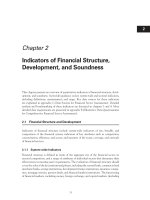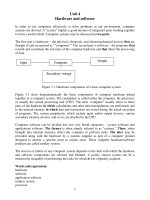Profit and Loss ppt
Bạn đang xem bản rút gọn của tài liệu. Xem và tải ngay bản đầy đủ của tài liệu tại đây (1.04 MB, 59 trang )
PROFIT AND LOSS
PROFIT AND LOSS
Ludwig
von Mises
Institute
AUBURN, ALABAMA
LUDWIG VON MISES
Copyright © 2008 Ludwig von Mises Institute
Ludwig von Mises Institute
518 West Magnolia Avenue
Auburn, Alabama 36832 U.S.A.
www.mises.org
ISBN: 978-1-933550-36-7
CONTENTS
A. The Economic Nature of Profit and Loss . . . . . . . . . 7
1. The Emergence of Profit and Loss . . . . . . . . . . . . 7
2. The Distinction Between Profits and
Other Proceeds. . . . . . . . . . . . . . . . . . . . . . . . . . . . 9
3. Non-Profit Conduct of Affairs . . . . . . . . . . . . . . . 11
4. The Ballot of the Market. . . . . . . . . . . . . . . . . . . . 13
5. The Social Function of Profit and Loss . . . . . . . . 19
6. Profit and Loss in the Progressing and in
the Retrogressing Economy. . . . . . . . . . . . . . . . . . 24
7. The Computation of Profit and Loss . . . . . . . . . . 26
B. The Condemnation of Profit . . . . . . . . . . . . . . . . . . . 33
1. Economics and the Abolition of Profit . . . . . . . . . 33
2. The Consequences of the Abolition of Profit . . . . 34
3. The Antiprofit Arguments . . . . . . . . . . . . . . . . . . . 37
4. The Equality Argument. . . . . . . . . . . . . . . . . . . . . 40
5. Communism and Poverty . . . . . . . . . . . . . . . . . . . 43
6. The Moral Condemnation of the Profit Motive . . 47
7. The Static Mentality . . . . . . . . . . . . . . . . . . . . . . . 50
C. The Alternative . . . . . . . . . . . . . . . . . . . . . . . . . . . . . 55
5
A. T
HE
E
CONOMIC
N
ATURE OF
P
ROFIT AND
L
OSS
1. The Emergence of Profit and Loss
In the capitalist system of society’s economic
organization the entrepreneurs determine the course
of production. In the performance of this function they
are unconditionally and totally subject to the sover-
eignty of the buying public, the consumers. If they fail
to produce in the cheapest and best possible way
those commodities which the consumers are asking for
most urgently, they suffer losses and are finally elimi-
nated from their entrepreneurial position. Other men
who know better how to serve the consumers replace
them.
If all people were to anticipate correctly the future
state of the market, the entrepreneurs would neither
earn any profits nor suffer any losses. They would
Ludwig von Mises (1881–1973) was dean of the Austrian School of
economics. This paper was prepared for the meeting of the Mont
Pèlerin Society held in Beauvallon, France, September 9–16, 1951. It
is included in Planning for Freedom (South Holland, Ill.: Libertarian
Press, 1952).
8PROFIT AND LOSS
have to buy the complementary factors of production
at prices which would, already at the instant of the
purchase, fully reflect the future prices of the prod-
ucts. No room would be left either for profit or for
loss. What makes profit emerge is the fact that the
entrepreneur who judges the future prices of the
products more correctly than other people do buys
some or all of the factors of production at prices
which, seen from the point of view of the future state
of the market, are too low. Thus the total costs of pro-
duction—including interest on the capital invested—
lag behind the prices which the entrepreneur receives
for the product. This difference is entrepreneurial
profit.
On the other hand, the entrepreneur who mis-
judges the future prices of the products allows for the
factors of production prices which, seen from the point
of view of the future state of the market, are too high.
His total cost of production exceeds the prices at
which he can sell the product. This difference is entre-
preneurial loss.
Thus profit and loss are generated by success or
failure in adjusting the course of production activities
to the most urgent demand of the consumers. Once
this adjustment is achieved, they disappear. The prices
of the complementary factors of production reach a
height at which total costs of production coincide with
the price of the product. Profit and loss are ever-pres-
ent features only on account of the fact that ceaseless
change in the economic data makes again and again
new discrepancies, and consequently the need for new
adjustments originates.
2. The Distinction Between Profits and
Other Proceeds
Many errors concerning the nature of profit and
loss were caused by the practice of applying the term
profit to the totality of the residual proceeds of an
entrepreneur.
Interest on the capital employed is not a compo-
nent part of profit. The dividends of a corporation are
not profit. They are interest on the capital invested
plus profit or minus loss.
The market equivalent of work performed by the
entrepreneur in the conduct of the enterprise’s affairs
is entrepreneurial quasi-wages but not profit.
If the enterprise owns a factor on which it can earn
monopoly prices, it makes a monopoly gain. If this
enterprise is a corporation, such gains increase the div-
idend. Yet they are not profit proper.
Still more serious are the errors due to the confu-
sion of entrepreneurial activity and technological inno-
vation and improvement.
The maladjustment the removal of which is the
essential function of entrepreneurship may often con-
sist in the fact that new technological methods have not
yet been utilized to the full extent to which they should
be in order to bring about the best possible satisfaction
of consumers’ demand. But this is not necessarily
always the case. Changes in the data, especially in con-
sumers' demand, may require adjustments which have
no reference at all to technological innovations and
improvements. The entrepreneur who simply
increases the production of an article by adding to the
existing production facilities a new outfit without any
LUDWIG VON MISES 9
change in the technological method of production is no
less an entrepreneur than the man who inaugurates a
new way of producing. The business of the entrepre-
neur is not merely to experiment with new technolog-
ical methods, but to select from the multitude of tech-
nologically feasible methods those which are best fit to
supply the public in the cheapest way with the things
they are asking for most urgently. Whether a new tech-
nological procedure is or is not fit for this purpose is to
be provisionally decided by the entrepreneur and will
be finally decided by the conduct of the buying public.
The question is not whether a new method is to be
considered as a more “elegant” solution of a techno-
logical problem. It is whether, under the given state of
economic data, it is the best possible method of sup-
plying the consumers in the cheapest way.
The activities of the entrepreneur consist in making
decisions. He determines for what purpose the factors
of production should be employed. Any other acts
which an entrepreneur may perform are merely acci-
dental to his entrepreneurial function. It is this that lay-
men often fail to realize. They confuse the entrepre-
neurial activities with the conduct of the technological
and administrative affairs of a plant. In their eyes not
the stockholders, the promoters and speculators, but
hired employees are the real entrepreneurs. The former
are merely idle parasites who pocket the dividends.
Now nobody ever contended that one could pro-
duce without working. But neither is it possible to pro-
duce without capital goods, the previously produced
factors of further production. These capital goods are
scarce, i.e., they do not suffice for the production of all
things which one would like to have produced. Hence
10 PROFIT AND LOSS
the economic problem arises: to employ them in such
a way that only those goods should be produced
which are fit to satisfy the most urgent demands of the
consumers. No good should remain unproduced on
account of the fact that the factors required for its pro-
duction were used—wasted—for the production of
another good for which the demand of the public is
less intense. To achieve this is under capitalism the
function of entrepreneurship that determines the allo-
cation of capital to the various branches of production.
Under socialism it would be a function of the state, the
social apparatus of coercion and oppression. The
problem of whether a socialist directorate, lacking any
method of economic calculation, could fulfill this func-
tion is not to be dealt with in this essay.
There is a simple rule of thumb to tell entrepre-
neurs from non-entrepreneurs. The entrepreneurs are
those on whom the incidence of losses on the capital
employed falls. Amateur-economists may confuse
profits with other kinds of intakes. But it is impossible
to fail to recognize losses on the capital employed.
3. Non-Profit Conduct of Affairs
What has been called the democracy of the market
manifests itself in the fact that profit-seeking business
is unconditionally subject to the supremacy of the buy-
ing public.
Non-profit organizations are sovereign unto them-
selves. They are, within the limits drawn by the
amount of capital at their disposal, in a position to
defy the wishes of the public.
LUDWIG VON MISES 11
1
Cf. Ludwig von Mises, Human Action: A Treatise on Economics (New
Haven, Conn.: Yale University Press, 1949), pp. 306–07; Bureaucracy,
(New Haven, Conn.: Yale University Press, 1944), pp. 40–73.
A special case is that of the conduct of government
affairs, the administration of the social apparatus of
coercion and oppression, viz. the police power. The
objectives of government, the protection of the invio-
lability of the individuals' lives and health and of their
efforts to improve the material conditions of their exis-
tence, are indispensable. They benefit all and are the
necessary prerequisite of social cooperation and civi-
lization. But they cannot be sold and bought in the
way merchandise is sold and bought; they have there-
fore no price on the market. With regard to them there
cannot be any economic calculation. The costs
expended for their conduct cannot be confronted with
a price received for the product. This state of affairs
would make the officers entrusted with the adminis-
tration of governmental activities irresponsible despots
if they were not curbed by the budget system. Under
this system the administrators are forced to comply
with detailed instructions enjoined upon them by the
sovereign, be it a self-appointed autocrat or the whole
people acting through elected representatives. To the
officers limited funds are assigned which they are
bound to spend only for those purposes which the
sovereign has ordered. Thus the management of pub-
lic administration becomes bureaucratic, i.e., depend-
ent on definite detailed rules and regulations.
Bureaucratic management is the only alternative
available where there is no profit and loss manage-
ment.
1
12 PROFIT AND LOSS
4. The Ballot of the Market
The consumers by their buying and abstention
from buying elect the entrepreneurs in a daily
repeated plebiscite as it were. They determine who
should own and who not, and how much each owner
should own.
As is the case with all acts of choosing a person—
choosing holders of public office, employees, friends,
or a consort—the decisions of the consumers are made
on the ground of experience and thus necessarily
always refers to the past. There is no experience of the
future. The ballot of the market elevates those who in
the immediate past have best served the consumers.
However, the choice is not unalterable and can daily
be corrected. The elected who disappoints the elec-
torate is speedily reduced to the ranks.
Each ballot of the consumers adds only a little to
the elected man’s sphere of action. To reach the upper
levels of entrepreneurship he needs a great number of
votes, repeated again and again over a long period of
time, a protracted series of successful strokes. He must
stand every day a new trial, must submit anew to
reelection as it were.
It is the same with his heirs. They can retain their
eminent position only by receiving again and again
confirmation on the part of the public. Their office is
revocable. If they retain it, it is not on account of the
deserts of their predecessor, but on account of their
own ability to employ the capital for the best possible
satisfaction of the consumers.
The entrepreneurs are neither perfect nor good in
any metaphysical sense. They owe their position
LUDWIG VON MISES 13
exclusively to the fact that they are better fit for the
performance of the functions incumbent upon them
than other people are. They earn profit not because
they are clever in performing their tasks, but because
they are more clever or less clumsy than other people
are. They are not infallible and often blunder. But they
are less liable to error and blunder less than other peo-
ple do. Nobody has the right to take offense at the
errors made by the entrepreneurs in the conduct of
affairs and to stress the point that people would have
been better supplied if the entrepreneurs had been
more skillful and prescient. If the grumbler knew bet-
ter, why did he not himself fill the gap and seize the
opportunity to earn profits? It is easy indeed to display
foresight after the event. In retrospect all fools become
wise.
A popular chain of reasoning runs this way: The
entrepreneur earns profit not only on account of the
fact that other people were less successful than he in
anticipating correctly the future state of the market. He
himself contributed to the emergence of profit by not
producing more of the article concerned; but for inten-
tional restriction of output on his part, the supply of
this article would have been so ample that the price
would have dropped to a point at which no surplus of
proceeds over costs of production expended would
have emerged. This reasoning is at the bottom of the
spurious doctrines of imperfect and monopolistic com-
petition. It was resorted to a short time ago by the
American Administration when it blamed the enter-
prises of the steel industry for the fact that the steel
production capacity of the United States was not
greater than it really was.
14 PROFIT AND LOSS
Certainly those engaged in the production of steel
are not responsible for the fact that other people did
not likewise enter this field of production. The
reproach on the part of the authorities would have
been sensible if they had conferred on the existing
steel corporations the monopoly of steel production.
But in the absence of such a privilege, the reprimand
given to the operating mills is not more justified than
it would be to censure the nation’s poets and musi-
cians for the fact that there are not more and better
poets and musicians. If somebody is to blame for the
fact that the number of people who joined the volun-
tary civilian defense organization is not larger, then it
is not those who have already joined but only those
who have not.
That the production of a commodity p is not larger
than it really is, is due to the fact that the comple-
mentary factors of production required for an expan-
sion were employed for the production of other com-
modities. To speak of an insufficiency of the supply of
p is empty rhetoric if it does not indicate the various
products m which were produced in too large quanti-
ties with the effect that their production appears now,
i.e., after the event, as a waste of scarce factors of pro-
duction. We may assume that the entrepreneurs who
instead of producing additional quantities of p turned
to the production of excessive amounts of m and con-
sequently suffered losses, did not intentionally make
their mistake.
Neither did the producers of p intentionally restrict
the production of p. Every entrepreneur’s capital is
limited; he employs it for those projects which, he
LUDWIG VON MISES 15
expects, will, by filling the most urgent demand of the
public, yield the highest profit.
An entrepreneur at whose disposal are 100 units of
capital employs, for instance, 50 units for the produc-
tion of p and 50 units for the production of q. If both
lines are profitable, it is odd to blame him for not hav-
ing employed more, e.g., 75 units, for the production
of p. He could increase the production of p only by
curtailing correspondingly the production of q. But
with regard to q the same fault could be found by the
grumblers. If one blames the entrepreneur for not hav-
ing produced more p, one must blame him also for not
having produced more q. This means: one blames the
entrepreneur for the facts that there is a scarcity of the
factors of production and that the earth is not a land
of Cockaigne.
Perhaps the grumbler will object on the ground
that he considers p a vital commodity, much more
important than q, and that therefore the production of
p should be expanded and that of q restricted. If this
is really the meaning of his criticism, he is at variance
with the valuations of the consumers. He throws off
his mask and shows his dictatorial aspirations. Produc-
tion should not be directed by the wishes of the pub-
lic but by his own despotic discretion.
But if our entrepreneur’s production of q involves
a loss, it is obvious that his fault was poor foresight
and not intentional.
Entrance into the ranks of the entrepreneurs in a
market society, not sabotaged by the interference of
government or other agencies resorting to violence, is
open to everybody. Those who know how to take
advantage of any business opportunity cropping up
16 PROFIT AND LOSS
will always find the capital required. For the market is
always full of capitalists anxious to find the most
promising employment for their funds and in search of
the ingenious newcomers, in partnership with whom
they could execute the most remunerative projects.
People often failed to realize this inherent feature
of capitalism because they did not grasp the meaning
and the effects of capital scarcity. The task of the
entrepreneur is to select from the multitude of techno-
logically feasible projects those which will satisfy the
most urgent of the not yet satisfied needs of the pub-
lic. Those projects for the execution of which the cap-
ital supply does not suffice must not be carried out.
The market is always crammed with visionaries who
want to float such impracticable and unworkable
schemes. It is these dreamers who always complain
about the blindness of the capitalists who are too stu-
pid to look after their own interests. Of course, the
investors often err in the choice of their investments.
But these faults consist precisely in the fact that they
preferred an unsuitable project to another that would
have satisfied more urgent needs of the buying public.
People often err very lamentably in estimating the
work of the creative genius. Only a minority of men
are appreciative enough to attach the right value to the
achievement of poets, artists, and thinkers. It may hap-
pen that the indifference of his contemporaries makes
it impossible for a genius to accomplish what he
would have accomplished if his fellow men had dis-
played better judgment. The way in which the poet
laureate and the philosopher à la mode are selected is
certainly questionable.
LUDWIG VON MISES 17
But it is impermissible to question the free market’s
choice of the entrepreneurs. The consumers' prefer-
ence for definite articles may be open to condemna-
tion from the point of view of a philosopher’s judg-
ment. But judgments of value are necessarily always
personal and subjective. The consumer chooses what,
as he thinks, satisfies him best. Nobody is called upon
to determine what could make another man happier or
less unhappy. The popularity of motor cars, television
sets, and nylon stockings may be criticized from a
“higher” point of view. But these are the things that
people are asking for. They cast their ballots for those
entrepreneurs who offer them this merchandise of the
best quality at the cheapest price.
In choosing between various political parties and
programs for the commonwealth’s social and eco-
nomic organization most people are uninformed and
groping in the dark. The average voter lacks the
insight to distinguish between policies suitable to
attain the ends he is aiming at and those unsuitable.
He is at a loss to examine the long chains of aprioris-
tic reasoning which constitute the philosophy of a
comprehensive social program. He may at best form
some opinion about the short-run effects of the poli-
cies concerned. He is helpless in dealing with the
long-run effects. The socialists and communists in
principle often assert the infallibility of majority deci-
sions. However, they belie their own words in criticiz-
ing parliamentary majorities rejecting their creed, and
in denying to the people, under the one-party system,
the opportunity to choose between different parties.
But in buying a commodity or abstaining from its pur-
chase there is nothing else involved than the consumer’s
18 PROFIT AND LOSS
longing for the best possible satisfaction of his instanta-
neous wishes. The consumer does not—like the voter in
political voting—choose between different means whose
effects appear only later. He chooses between things
which immediately provide satisfaction. His decision is
final.
An entrepreneur earns profit by serving the con-
sumers, the people, as they are and not as they should
be according to the fancies of some grumbler or
potential dictator.
5. The Social Function of Profit and Loss
Profits are never normal. They appear only where
there is a maladjustment, a divergence between actual
production and production as it should be in order to
utilize the available material and mental resources for
the best possible satisfaction of the wishes of the pub-
lic. They are the prize of those who remove this mal-
adjustment; they disappear as soon as the maladjust-
ment is entirely removed. In the imaginary construc-
tion of an evenly rotating economy there are no prof-
its. There the sum of the prices of the complementary
factors of production, due allowance being made for
time preference, coincides with the price of the prod-
uct.
The greater the preceding maladjustments, the
greater the profit earned by their removal. Maladjust-
ments may sometimes be called excessive. But it is
inappropriate to apply the epithet “excessive” to prof-
its.
LUDWIG VON MISES 19
People arrive at the idea of excessive profits by
confronting the profit earned with the capital
employed in the enterprise and measuring the profit as
a percentage of the capital. This method is suggested
by the customary procedure applied in partnerships
and corporations for the assignment of quotas of the
total profit to the individual partners and shareholders.
These men have contributed to a different extent to
the realization of the project and share in the profits
and losses according to the extent of their contribu-
tion.
But it is not the capital employed that creates prof-
its and losses. Capital does not “beget profit” as Marx
thought. The capital goods as such are dead things that
in themselves do not accomplish anything. If they are
utilized according to a good idea, profit results. If they
are utilized according to a mistaken idea, no profit or
losses result. It is the entrepreneurial decision that cre-
ates either profit or loss. It is mental acts, the mind of
the entrepreneur, from which profits ultimately origi-
nate. Profit is a product of the mind, of success in
anticipating the future state of the market. It is a spiri-
tual and intellectual phenomenon.
The absurdity of condemning any profits as exces-
sive can easily be shown. An enterprise with a capital
of the amount c produced a definite quantity of p
which it sold at prices that brought a surplus of pro-
ceeds over costs of s and consequently a profit of n
per cent. If the entrepreneur had been less capable, he
would have needed a capital of 2c for the production
of the same quantity of p. For the sake of argument we
may even neglect the fact that this would have neces-
sarily increased costs of production as it would have
20 PROFIT AND LOSS
doubled the interest on the capital employed, and we
may assume that s would have remained unchanged.
But at any rate s would have been confronted with 2c
instead of c and thus the profit would have been only
n/2 per cent of the capital employed. The “excessive”
profit would have been reduced to a “fair” level. Why?
Because the entrepreneur was less efficient and
because his lack of efficiency deprived his fellow men
of all the advantages they could have got if an amount
c of capital goods had been left available for the pro-
duction of other merchandise.
In branding profits as excessive and penalizing the
efficient entrepreneurs by discriminatory taxation,
people are injuring themselves. Taxing profits is tanta-
mount to taxing success in best serving the public. The
only goal of all production activities is to employ the
factors of production in such a way that they render
the highest possible output. The smaller the input
required for the production of an article becomes, the
more of the scarce factors of production are left for the
production of other articles. But the better an entre-
preneur succeeds in this regard, the more is he vilified
and the more is he soaked by taxation. Increasing
costs per unit of output, that is, waste, is praised as a
virtue.
The most amazing manifestation of this com-
plete failure to grasp the task of production and the
nature and functions of profit and loss is shown in
the popular superstition that profit is an addendum to
the costs of production, the height of which depends
uniquely on the discretion of the seller. It is this belief
that guides governments in controlling prices. It is the
same belief that has prompted many governments to
LUDWIG VON MISES 21
make arrangements with their contractors according to
which the price to be paid for an article delivered is to
equal costs of production expended by the seller
increased by a definite percentage. The effect was that
the purveyor got a surplus the higher, the less he suc-
ceeded in avoiding superfluous costs. Contracts of this
type enhanced considerably the sums the United States
had to expend in the two World Wars. But the bureau-
crats, first of all the professors of economics who
served in the various war agencies, boasted of their
clever handling of the matter.
All people, entrepreneurs as well as non-entrepre-
neurs, look askance upon any profits earned by other
people. Envy is a common weakness of men. People
are loath to acknowledge the fact that they themselves
could have earned profits if they had displayed the
same foresight and judgment the successful business-
man did. Their resentment is the more violent, the
more they are subconsciously aware of this fact.
There would not be any profits but for the eager-
ness of the public to acquire the merchandise offered
for sale by the successful entrepreneur. But the same
people who scramble for these articles vilify the busi-
nessman and call his profit ill-got.
The semantic expression of this enviousness is the
distinction between earned and unearned income. It
permeates the textbooks, the language of the laws and
administrative procedure. Thus, for instance, the official
Form 201 for the New York State Income Tax Return
calls “Earnings” only the compensation received by
employees and, by implication, all other income, also
that resulting from the exercise of a profession,
unearned income. Such is the terminology of a state
22 PROFIT AND LOSS
whose governor is a Republican and whose state
assembly has a Republican majority.
Public opinion condones profits only as far as they
do not exceed the salary paid to an employee. All sur-
plus is rejected as unfair. The objective of taxation is,
under the ability-to-pay principle, to confiscate this
surplus.
Now one of the main functions of profits is to shift
the control of capital to those who know how to
employ it in the best possible way for the satisfaction
of the public. The more profits a man earns, the
greater his wealth consequently becomes, the more
influential does he become in the conduct of business
affairs. Profit and loss are the instruments by means of
which the consumers pass the direction of production
activities into the hands of those who are best fit to
serve them. Whatever is undertaken to curtail or to
confiscate profits impairs this function. The result of
such measures is to loosen the grip the consumers
hold over the course of production. The economic
machine becomes, from the point of view of the peo-
ple, less efficient and less responsive.
The jealousy of the common man looks upon the
profits of the entrepreneurs as if they were totally used
for consumption. A part of them is, of course, con-
sumed. But only those entrepreneurs attain wealth and
influence in the realm of business who consume
merely a fraction of their proceeds and plough back
the much greater part into their enterprises. What
makes small business develop into big business is not
spending, but saving and capital accumulation.
LUDWIG VON MISES 23
6. Profit and Loss in the Progressing and
in the Retrogressing Economy
We call a stationary economy an economy in which
the per head quota of the income and wealth of the
individuals remains unchanged. In such an economy
what the consumers spend more for the purchase of
some articles must be equal to what they spend less
for other articles. The total amount of the profits
earned by one part of the entrepreneurs equals the
total amount of losses suffered by other entrepreneurs.
A surplus of the sum of all profits earned in the
whole economy above the sum of all losses suffered
emerges only in a progressing economy, that is in an
economy in which the per head quota of capital
increases. This increment is an effect of saving that
adds new capital goods to the quantity already previ-
ously available. The increase of capital available cre-
ates maladjustments insofar as it brings about a dis-
crepancy between the actual state of production and
that state which the additional capital makes possible.
Thanks to the emergence of additional capital, certain
projects which hitherto could not be executed become
feasible. In directing the new capital into those chan-
nels in which it satisfies the most urgent among the
previously not satisfied wants of the consumers, the
entrepreneurs earn profits which are not counterbal-
anced by the losses of other entrepreneurs.
The enrichment which the additional capital gen-
erates goes only in part to those who have created it
by saving. The rest goes, by raising the marginal pro-
ductivity of labor and thereby wage rates, to the earn-
ers of wages and salaries and, by raising the prices of
24 PROFIT AND LOSS









